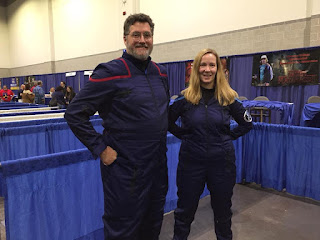What Does It Mean to Be Human/Developing Technology
What concerns does Star Trek raise about the relationship between humans and technology? How do these concerns relate to current discussions about technology today?
Star Trek raises concerns about the human/technology relationship in many of its episodes and films. Many of the issues raised, such as the potential "personhood" of artificial intelligences (The Doctor on Voyager and Data on TNG giving us most of these storylines) or the ethics around genetic manipulation and its slippery slope to eugenics, have applications today.
I think the most fundamental Star Trek story around humans and technology, though, is in the film Star Trek: Insurrection. The film opens with a soothing montage of happy, relaxed, playful (but busy) people, creating, cooking, and working the land. The first time I saw the film, this sequence provoked a physical relaxation response in me. As the narrative unfolds, we learn that the Ba'ku do, in fact, possess technological capabilities but have chosen not to employ advanced tech in their daily lives. In the words of the character Sojef: "We believe that when you create a machine to do the work of a man, you take something away from the man." Or Anij: "...where can warp drive take us, except away from here?"
The Ba'ku also enjoy a profound sense of community, and seem to spend their days working and playing together for the benefit of all. Every time I watch Insurrection, I think of the ways in which technology has isolated us from one another. Constantly, I see kids hanging out with their friends, but each child is staring at their phone. Couples scroll side-by-side or across from one another at the dinner table. Community organizations are struggling for membership and involvement. Our hyper-individualistic outlook (America) is augmented and validated by the fact that our primary interactions are with electronic devices. Take something away from the man, indeed.
Because the Ba'ku are engaging fully with their surroundings and not with or through technology, they experience a kind of timeless flow (we call it mindfulness, I think). Their society is also a peaceful one, and the Enterprise crew are asked to disarm themselves while their in the Ba'ku village because it is a "sanctuary of life."
And, of course, Data plays a critical role. Having malfunctioned in full view of the Ba'ku village residents, including one child who becomes very apprehensive of him, Data provides an ongoing character and plot point to showcase the Ba'ku's low-tech lifestyle (copied from IMDB):
Data : Captain, the boy is afraid of me.
Captain Picard : It's nothing personal, Data. You have to remember, these people have rejected technology.
Data : I am the personification of everything they have rejected.
Captain Picard : Until this week, that young man probably never saw a machine, let alone one that walks and talks.
Star Trek: Insurrection provides an opportunity to meditate on the wisdom of blindly adopting new technologies just because we can. I'm not sure I'd go for a full-on tech ban as the Ba'ku have, but I do sometimes wish we were more measured and thoughtful in the kinds of technologies we adopt and, especially, the extent to which we allow them to govern our lives. I can't help but wonder if we're losing a bit of our humanity along the way (check out Dan Brown's Origin for more on this--I won't spoil it).




Comments
Post a Comment